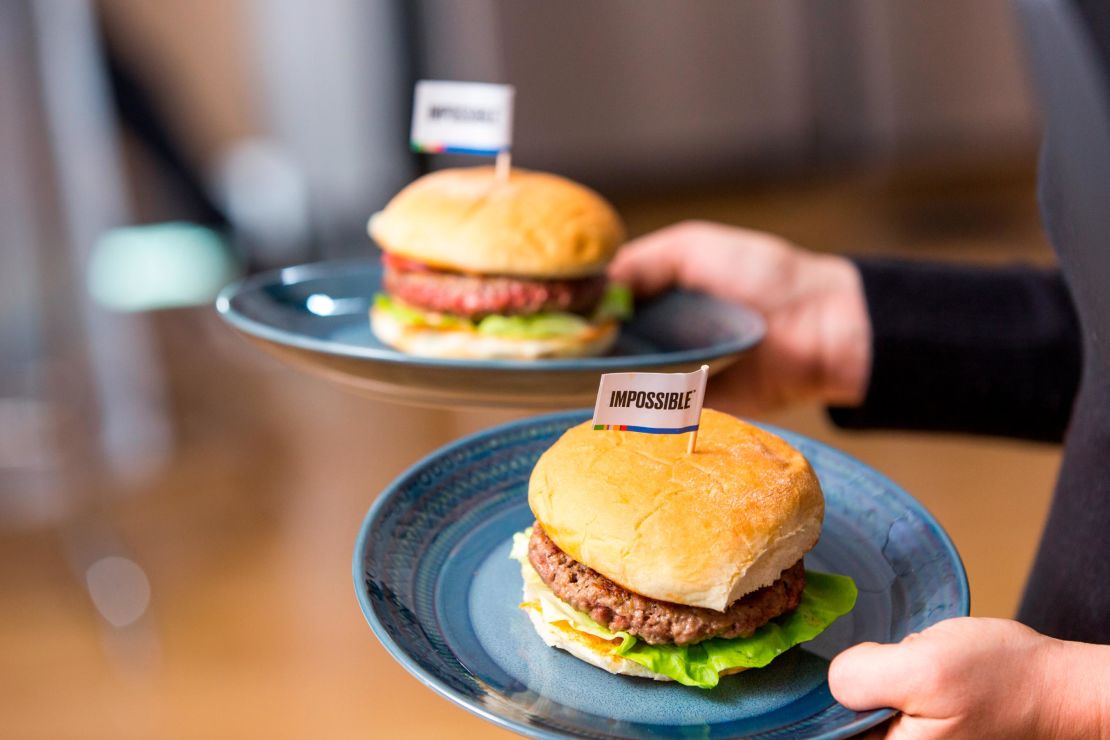The plant-based protein trendis growing more rapidly than most people anticipated.
Just this week, Beyond Meat (BYND), which makes meatless alternatives to beef, pork and poultry, went public. Its main competitor, Impossible Foods, reported that demand is so high it’s causing a shortage. Burger King announced plans to roll out an Impossible burger nationally, and Ikea said it’s developing a new meatless meatball designed to taste like animal meat.
“It’s definitely taking off at a rate … that has not been seen before,” said Dewey Warner, a research analyst at the market research provider Euromonitor International. Warner examines developments in the food sector.
Demand for plant-based meat alternatives is being fueled by consumers looking to make their diets healthier and reduce their impact on the environment. And there’s clearly room for growth. The question is, how much?
A wild week for plant-based protein
Beyond had a wildly successful first day of trading on Thursday, surging 163% above its IPO price of $25. The stock closed at nearly $67 a share on Friday.
Meanwhile Impossible Foods, Beyond’s main competitor, is seeing so much interest that it’s running out of product. Impossible CFO David Lee told CNN Business that this year, demand for Impossible’s meatless protein has more than doubled at the roughly 7,000 restaurants it serves. On top of that, Impossible is about to more than double the amount of restaurants it serves: This week, Burger King announced that it’s going to roll out a version of its Whopper featuring an Impossible patty at its roughly 7,300 stores nationwide.
Other chains, like White Castle, Carl’s Jr., Bareburger, Qdoba and others also feature Beyond Meat or Impossible Foods items on their menus. People can buy Beyond Meat at supermarkets like Safeway or Kroger, and Impossible plans to start selling in retail locations this year.

Even Ikea is jumping on the trend. The furniture retailer known for its Swedish meatballs said on Thursday that it will start testing out a new plant-based version of its classic meatball, designed to taste just like meat, next year.
For Impossible, the question a year ago was, “How quickly will the market develop?” David Lee, the company’s CFO, told CNN Business this week. “Now, it’s clearly, ‘How quickly can we create more capacity to supply this tremendous amount of demand?’”
What’s driving the trend
Veganism and vegetarianism used to appeal mostly to those worried about animal welfare, said Warner, the Euromonitor analyst. But concerns over climate change and health are driving a larger group of people to rethink how much meat they consume, he added.
Because of that, growth among plant-based protein products designed to mimic the taste and appearance of meat has been growing over the past decade, he said, and especially in the past five years.
Beyond, which started about 10 years ago, saw demand in spike in 2017 and 2018, CEO Ethan Brown told CNN Business.
During those years, consumers “moved so quickly into this category” because they were “bombarded” with information about the negative health and environmental effects of processed red meat, he said. A few years prior, in 2015, the World Health Organization linked the consumption of processed meat to cancer, and named red meat a likely carcinogen.
There was so much interest that Beyond had to redevelop its supply chain and production processes to make sure it could keep up.

Companies like Beyond Meat and Impossible Foodshighlight the environmental and health benefits of reducing meat consumption when marketing their products. Two of Beyond Meat’s four stated goals are to curb climate change and preserve natural resources. The others are to improve human health and animal welfare.
Similarly, Impossible argues that “animal agriculture occupies almost half the land on Earth, consumes a quarter of our freshwater and destroys our ecosystems.” Its mission is to “save the best planet in the known universe” while making sure people can still enjoy the experience of eating meat.
As people come around to eating less meat, fast food chains like Burger King are pitching plant-based products toward meat eaters. Burger King, for example, said it was going after meat lovers who want to diversify their diets with its Impossible Whopper test, rather than vegans or vegetarians.
Where it’s going
It looks like the plant-based trend is here to stay.
“There’s a lot of flash-in-the-pan, fast-growing things in the food industry,” Warner said. But growth in the plant-based meat alternative space is accelerating, he said, indicating that “this is more than just a fad. This may have some staying power.”
Plus, there’s growth in parts of the sector — like plant-based alternatives to seafood — that haven’t hit the mainstream yet.
Brown, for his part, sees “unlimited growth” potential for his company. “As the sector becomes even more and more attractive, we’re ready,” he said.
In a Securities and Exchange Commission filing that detailed plans for the company’s initial pubic offering, Beyond Meat projected that over time, the plant-based meat market could reach $35 billion in the United States. That’s an ambitious target. Euromonitor International has a more modest forecast of a $2.5 billion retail market for meat substitutes in the United States.
In its filing, Beyond Meat reported that its net revenue has grown from $16.2 million in 2016 to $87.9 million last year. Beyond Meat also lost $29.9 million last year, which it attributed to investments in “innovation and growth of our business.” The company added that it expects to continue investing in innovation, supply chain capabilities, manufacturing and marketing.
And there are latent threats to the industry, like consumer preference for simple, natural foods with few ingredients. Beyond Meat is made mostly with water, pea protein and oil, and more than a dozen other ingredients. Impossible Foods uses soy-based protein.
People seeking wholesome ingredients may shy away from these types of products, creating potential headwinds in the industry, Warner said.


























